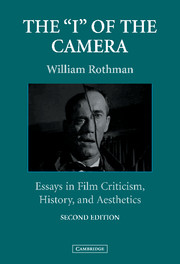Book contents
- Frontmatter
- Contents
- Foreword to the Second Edition
- Preface to the First Edition
- Acknowledgments
- Notes on the Essays
- The “I” of the camera
- 1 Hollywood Reconsidered: Reflections on the Classical American Cinema
- 2 D. W. Griffith and the Birth of the Movies
- 3 Judith of Bethulia
- 4 True Heart Griffith
- 5 The Ending of City Lights
- 6 The Goddess: Reflections on Melodrama East and West
- 7 Red Dust: The Erotic Screen Image
- 8 Virtue and Villainy in the Face of the Camera
- 9 Pathos and Transfiguration in the Face of the Camera: A Reading of Stella Dallas
- 10 Viewing the World in Black and White: Race and the Melodrama of the Unknown Woman
- 11 Howard Hawks and Bringing Up Baby
- 12 The Filmmaker in the Film: Octave and the Rules of Renoir's Game
- 13 Stagecoach and the Quest for Selfhood
- 14 To Have and Have Not Adapted a Film from a Novel
- 15 Hollywood and the Rise of Suburbia
- 16 Nobody's Perfect: Billy Wilder and the Postwar American Cinema
- 17 The River
- 18 Vertigo: The Unknown Woman in Hitchcock
- 19 North by Northwest: Hitchcock's Monument to the Hitchcock Film
- 20 The Villain in Hitchcock: “Does He Look Like a ‘Wrong One’ to You?”
- 21 Thoughts on Hitchcock's Authorship
- 22 Eternal Véritées: Cinema-Vérité and Classical Cinema
- 23 Visconti's Death in Venice
- 24 Alfred Guzzetti's Family Portrait Sittings
- 25 The Taste for Beauty: Eric Rohmer's Writings on Film
- 26 Tale of Winter: Philosophical Thought in the Films of Eric Rohmer
- 27 The “New Latin American Cinema”
- 28 Violence and Film
- 29 What Is American about American Film Study?
- Index
29 - What Is American about American Film Study?
Published online by Cambridge University Press: 05 June 2012
- Frontmatter
- Contents
- Foreword to the Second Edition
- Preface to the First Edition
- Acknowledgments
- Notes on the Essays
- The “I” of the camera
- 1 Hollywood Reconsidered: Reflections on the Classical American Cinema
- 2 D. W. Griffith and the Birth of the Movies
- 3 Judith of Bethulia
- 4 True Heart Griffith
- 5 The Ending of City Lights
- 6 The Goddess: Reflections on Melodrama East and West
- 7 Red Dust: The Erotic Screen Image
- 8 Virtue and Villainy in the Face of the Camera
- 9 Pathos and Transfiguration in the Face of the Camera: A Reading of Stella Dallas
- 10 Viewing the World in Black and White: Race and the Melodrama of the Unknown Woman
- 11 Howard Hawks and Bringing Up Baby
- 12 The Filmmaker in the Film: Octave and the Rules of Renoir's Game
- 13 Stagecoach and the Quest for Selfhood
- 14 To Have and Have Not Adapted a Film from a Novel
- 15 Hollywood and the Rise of Suburbia
- 16 Nobody's Perfect: Billy Wilder and the Postwar American Cinema
- 17 The River
- 18 Vertigo: The Unknown Woman in Hitchcock
- 19 North by Northwest: Hitchcock's Monument to the Hitchcock Film
- 20 The Villain in Hitchcock: “Does He Look Like a ‘Wrong One’ to You?”
- 21 Thoughts on Hitchcock's Authorship
- 22 Eternal Véritées: Cinema-Vérité and Classical Cinema
- 23 Visconti's Death in Venice
- 24 Alfred Guzzetti's Family Portrait Sittings
- 25 The Taste for Beauty: Eric Rohmer's Writings on Film
- 26 Tale of Winter: Philosophical Thought in the Films of Eric Rohmer
- 27 The “New Latin American Cinema”
- 28 Violence and Film
- 29 What Is American about American Film Study?
- Index
Summary
For over a decade, the Hawaii International Film Festival has been the world's premier showcase for significant new films from Asia and for American films that, in whatever ways, contribute meaningfully to the enrichment of mutual understanding between Asia and America. Of all the exemplary features of the Hawaii Festival – the fact that all screenings are free to the community, for example – none has proved worthier than the annual Symposium in which we are all presently engaged.
I have had the pleasure and privilege of participating in three of these events. There is no way I can exaggerate their importance to my own education in Asian cinema (this also means my education in cinema, as every Asian nation, like every Western one, has participated in its own way in the international history of film).
The first was in 1985. At that time, I possessed little special knowledge of Asian films or the conditions of their production beyond what was expected of any conscientious American professor of film study. This was more than we were expected to know about Martian cinema, but not much more.
Apart from the Apu trilogy and perhaps one or two other films by Satyajit Ray, few among us, in 1985, knew the work of any “serious” Indian directors or were familiar, except by hearsay, with the vast subcontinent of the Indian commercial cinema. Other than martial arts films, few of us had seen a single film from Hong Kong, Taiwan, or mainland China.
- Type
- Chapter
- Information
- The 'I' of the CameraEssays in Film Criticism, History, and Aesthetics, pp. 358 - 380Publisher: Cambridge University PressPrint publication year: 2003



